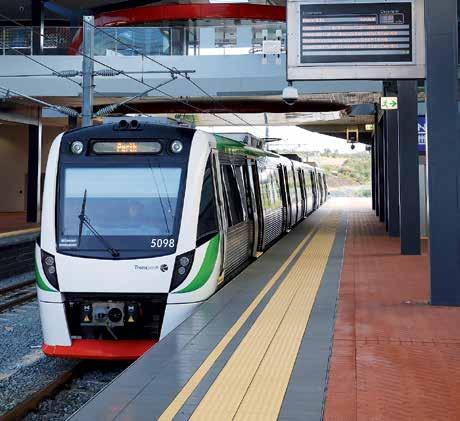
3 minute read
Western Australia
from REX Aug 2019
by Prime Group
AutoHaul cements WA as ‘global leader in rail tech’
WESTERN AUSTRALIA’S MINES AND petroleum minister Bill Johnston says the completed rollout of Rio Tinto’s AutoHaul autonomous train program is a testament to the state’s pioneering of rail technology. Senior Rio staff joined government officials and technology partners to celebrate the successful rollout of AutoHaul on June 14.
Rio spent $940 million delivering the AutoHaul program, which allows its 2.4-kilometre-long iron ore trains transport thousands of tonnes of iron ore from its Pilbara mines to export sites on WA’s north-west coastline, autonomously. Under AutoHaul, Rio’s fleet of 200 locomotives operate across 1,700 kilometres of private track, monitored by the miner’s Perth control centre, 1,500 kilometres away.
By the time the formal ceremony was held in June to recognise the successful launch of the program, trains had safely travelled more than 4.5 million kilometres autonomously since they were first deployed in 2018, the miner said.
Johnston, who represents the electorate of Cannington in Perth’s south, praised Rio’s work in the state’s north.
“I’d like to congratulate Rio Tinto, Hitachi-Ansaldo and all the other project partners for their hard work and dedication over the past decade in delivering this project, which really cements our state as a global leader in rail technology,” he said. “AutoHaul has brought the rail
Rio’s automated trains are controlled from its centre in Perth.
freight industry in this country into the 21st century and is rightfully the subject of global interest … the development of the world’s biggest robot is such a success because of the contribution from Western Australia’s skilled engineers and innovative workers.”
Automated trains have run more than 4.5 million kilometres on Rio’s railway since first operations last year.
PHOTOGRAPHY CREDIT: RIO TINTO

The project, which has been in the making for over 10 years since the launch of Rio Tinto’s Mine of the Future initiative in 2008, is considered the world’s first automated heavy-haul long distance rail network, delivering its first iron ore in July 2018.
Rio Tinto Iron Ore managing director Ivan Vella said that the project had attracted worldwide interest and cemented Western Australia as a heavy-haul rail leader.
“The success of AutoHaul would not have been possible without the expertise, collaboration and dedication of teams within Rio Tinto and our numerous partners,” Vella said.
“This project has cemented Western Australia as a leader in the heavy-haul rail industry and has attracted interest from around the world. The successful deployment of the world’s first heavy-haul long distance rail network demonstrates the potential for significant further improvement in such operations with others around the world looking to replicate.”
WA submits ATC business case for federal funding
WEST AUSTRALIAN TRANSPORT minister Rita Saffioti says a newlysubmitted business case for Automatic Train Control (ATC) will pave the way for federal funding to improve signalling on Perth’s rail network.
The state government said on June 22 it had sent a business case for ATC to Infrastructure Australia. Approval from the independent advisory body would potentially facilitate funding support from the federal government.
The ATC program would gradually replace Perth’s ageing signalling network with a modern state-of-the-art digital version, Saffioti said.
“The McGowan Government continues to press the case for more federal funding for WA infrastructure projects, and putting our plans to Infrastructure Australia is a key part of that,” the minister said. In September 2017 the McGowan Government committed $7.4 million over two years to plan its new signalling project, which will come under its Metronet urban rail program.
“Metronet is about thinking beyond the immediate future and anticipating what Perth’s future transport needs will be,” Saffioti said.
“Part of this will be making sure our existing network is modernised and
PHOTOGRAPHY CREDIT: RAIL GALLERY
continues to deliver what commuters need. Automatic Train Control is an exciting project that allows for future
Under the proposal, Perth’s ageing signalling network would gradually be replaced with a modern solution.

capacity growth and will give passengers more frequent, reliable, safe and punctual train operations.”
WA’s Metronet program is boosting capacity across Perth’s passenger network.
www.railexpress.com.au PHOTOGRAPHY CREDIT: RAIL GALLERY











